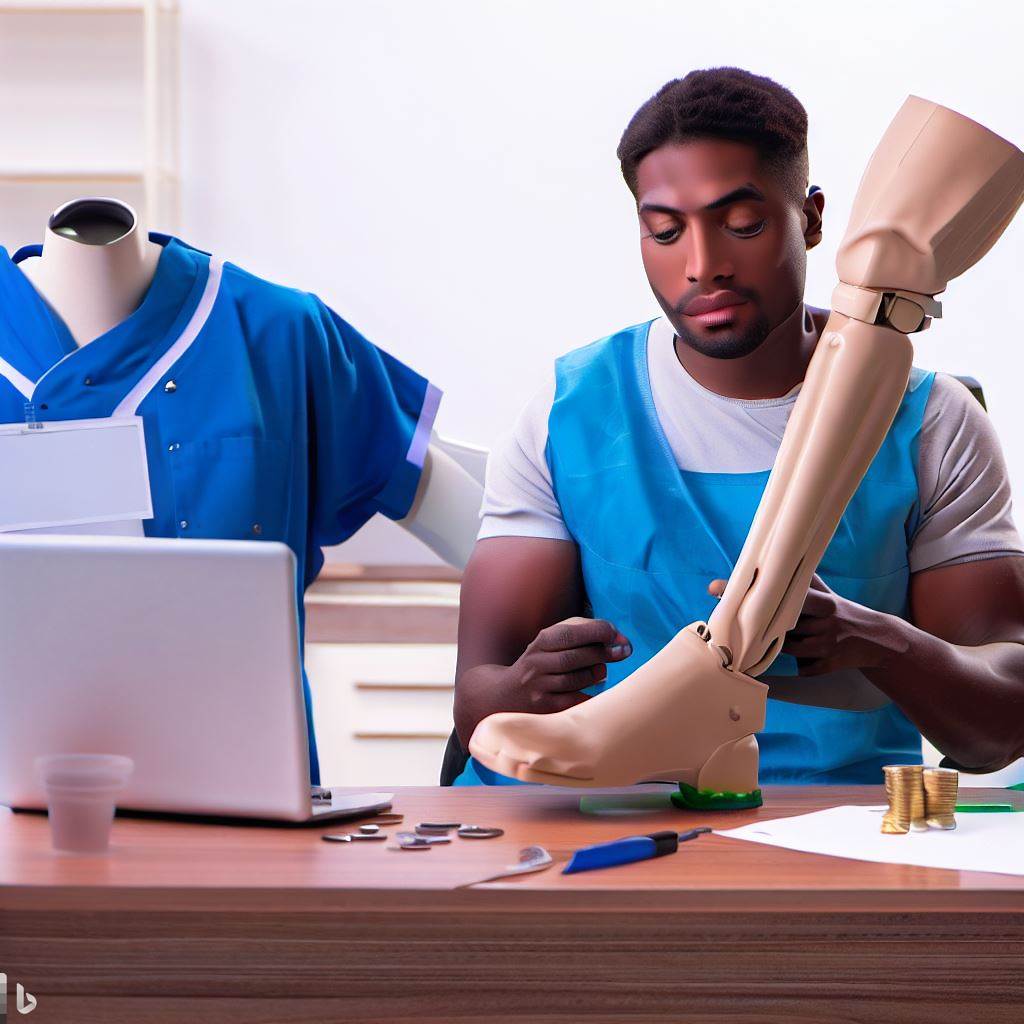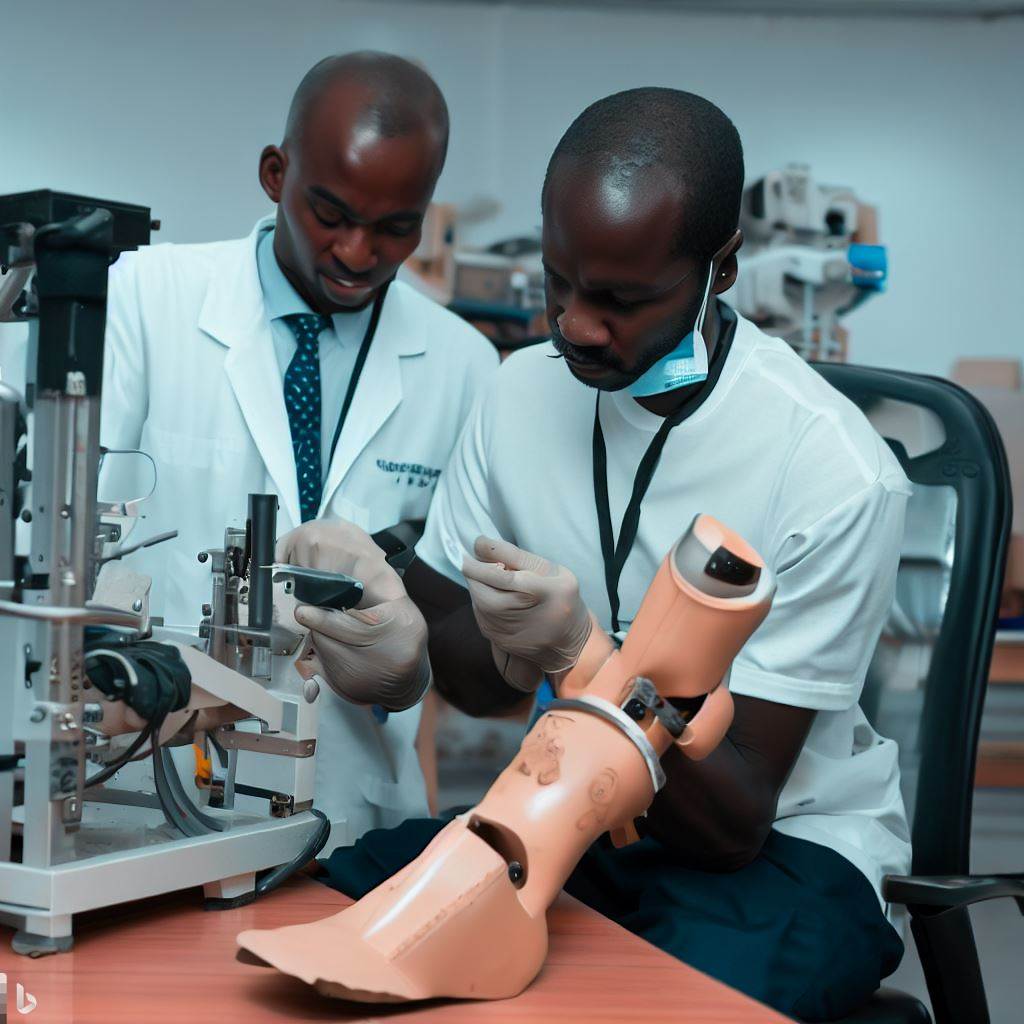Introduction
Orthotic and prosthetic jobs in Nigeria are gaining increased recognition and demand in recent years.
Orthotics and prosthetics refer to the branch of healthcare specializing in the design, production, and application of medical devices, such as braces, artificial limbs, and orthopedic footwear.
Mention the growing demand for orthotic and prosthetic professionals in Nigeria
Nigeria, with its large population and increasing awareness of physical disabilities, is experiencing a growing demand for orthotic and prosthetic professionals.
This demand is fueled by factors such as an aging population, increasing prevalence of chronic diseases, and a rising number of traumatic injuries.
The role of orthotic and prosthetic professionals is essential in improving the quality of life for individuals facing physical challenges.
These professionals work closely with patients to evaluate their needs and develop personalized solutions, including custom-made orthotic devices or prostheses.
Despite the increasing demand, Nigeria currently faces a shortage of qualified orthotic and prosthetic practitioners.
This presents a significant opportunity for individuals interested in pursuing a career in this field, as job prospects are expected to be highly favorable.
As for the pay, orthotic and prosthetic professionals in Nigeria can expect a competitive salary.
While the exact figures vary depending on factors such as experience and location, these professionals can enjoy a rewarding career with the potential for growth and advancement.
Therefore, the scope and demand for orthotic and prosthetic jobs in Nigeria are expanding rapidly.
Individuals passionate about helping others overcome physical challenges and interested in a fulfilling career should consider the field of orthotics and prosthetics.
With the growing demand and competitive pay, this profession offers numerous opportunities for professional growth and personal satisfaction.
Orthotics Jobs in Nigeria
Orthotics is a specialized field within healthcare that focuses on designing, fitting, and fabricating devices, such as braces, to support or correct musculoskeletal deformities and impairments.
The scope of orthotic jobs in Nigeria is extensive, given the large population and the prevalence of conditions that require orthotic interventions.
Orthotic professionals play a crucial role in helping individuals regain mobility and improving their quality of life.
Educational and Training Requirements
Becoming an orthotic professional requires a combination of formal education and practical training.
A minimum of a bachelor’s degree in orthotics and prosthetics from a recognized institution is typically required.
In addition to formal education, aspiring orthotic professionals must complete a supervised clinical residency to gain hands-on experience in diagnosing, designing, and fitting orthotic devices.
Settings Where Orthotic Professionals Work
Orthotic professionals are employed in a variety of settings, including hospitals, rehabilitation centers, private clinics, and orthopedic clinics.
Hospitals provide an opportunity to work as part of a multidisciplinary team, collaborating with surgeons, physiotherapists, and other healthcare professionals.
Rehabilitation centers specialize in providing comprehensive care to patients with orthopedic conditions.
Private clinics offer orthotic services to individuals seeking personalized care, while orthopedic clinics focus specifically on musculoskeletal disorders.
Challenges Faced by Orthotic Professionals in Nigeria
Orthotic professionals in Nigeria face various challenges that impact their ability to deliver optimal care. Limited resources, including equipment and materials, make it difficult to provide the best orthotic solutions to patients.
Inadequate awareness and understanding of orthotic interventions among both healthcare professionals and the general public can also hinder the demand for orthotic services.
Read: The Path to Becoming a Surgeon in Nigeria
Potential Salary Range for Orthotic Jobs in Nigeria
The salary range for orthotic professionals in Nigeria can vary depending on several factors, such as experience, qualifications, and the employing institution.
Entry-level orthotic professionals can expect to earn a salary in the range of ₦100,000 to ₦200,000 per month, while experienced professionals with advanced certifications and significant experience may earn upwards of ₦500,000 per month.
In short, orthotic jobs in Nigeria offer a wide scope of practice, requiring specialized education, training, and practical experience.
Orthotic professionals face challenges related to resources and awareness but can expect a competitive salary based on their qualifications and experience.
Read: Life of an Orthotist/Prosthetist in Nigeria Revealed
Prosthetic Jobs in Nigeria
Prosthetics are artificial limbs or body parts that are designed to replace missing ones.
They play a crucial role in improving the quality of life for individuals who have undergone amputation. In Nigeria, the field of prosthetics offers a wide scope of job opportunities.
To become a prosthetic professional in Nigeria, one must acquire the necessary educational and training requirements.
This typically involves obtaining a bachelor’s degree in prosthetics and orthotics or a related field. Additional certifications and practical experience are also beneficial.
Prosthetic professionals can work in various settings, including hospitals, prosthetic clinics, and non-governmental organizations (NGOs).
They play a vital role in assessing patients’ needs, designing and fabricating prosthetic limbs, and providing rehabilitative services.
However, prosthetic professionals in Nigeria face several challenges.
The country’s healthcare system often lacks adequate resources and access to advanced technology, making it difficult to provide the best care possible.
Despite these challenges, they remain committed to improving the lives of amputees.
In terms of salary, the potential range for prosthetic jobs in Nigeria varies depending on factors such as experience, qualifications, and the employing organization.
On average, prosthetic professionals can earn between N400,000 to N800,000 annually.
In review, prosthetic jobs in Nigeria have a significant impact on the lives of amputees, improving their mobility and overall quality of life.
The field offers a wide scope of job opportunities, with professionals working in hospitals, clinics, and NGOs.
While there are challenges, such as limited resources and technology, prosthetic professionals remain dedicated to providing the best care possible.
The potential salary range is attractive, making it a rewarding career choice for those interested in helping others.
Read: Medical Lab Technician: Required Education in Nigeria

Learn More: Nigeria’s Demand for Marriage & Family Therapists: A Study
Find Out More: Physician Assistant Salary and Compensation in Nigeria
Comparison Between Orthotic and Prosthetic Jobs
Orthotic and prosthetic jobs both involve working with patients to provide assistive devices.
Orthotists specialize in designing and fitting braces and other orthopedic devices, while prosthetists focus on creating and fitting artificial limbs.
Both professionals collaborate closely with healthcare providers and patients to ensure the best outcome.
Orthotists and prosthetists play a crucial role in improving the mobility and quality of life for individuals with physical disabilities.
Similarities and Differences in Job Roles and Responsibilities
- Orthotists and prosthetists assess patients’ needs, take measurements, and create custom-made devices.
- Orthotists primarily work with orthopedic conditions, such as spine or limb deformities, while prosthetists focus on limb amputations.
- Orthotists may also work with musculoskeletal disorders, while prosthetists concentrate on amputations caused by accidents or medical conditions.
- Orthotists provide braces and splints to support and stabilize joints, while prosthetists design and fit artificial limbs to replace missing limbs.
- Both professionals evaluate patient progress, make adjustments to devices, and provide ongoing support and care.
Shared Challenges Faced by Orthotic and Prosthetic Professionals in Nigeria
- Limited awareness and understanding of the field among the general population.
- Limited availability of specialized training programs and educational resources in Nigeria.
- Lack of standardized regulations and licensing requirements for orthotists and prosthetists.
- Limited funding and resources for research and development of innovative orthotic and prosthetic devices.
- Inadequate access to quality materials and equipment to create and repair devices.
Potential for Collaboration between Orthotic and Prosthetic Fields in Nigeria
- Collaboration can improve patient outcomes by combining the expertise of both orthotists and prosthetists.
- Joint research and development efforts can lead to advancements in orthotic and prosthetic devices.
- Sharing knowledge and best practices can enhance the overall quality of care provided.
- Collaborative efforts can help address the challenges faced by both fields, such as limited resources and training opportunities.
- Interdisciplinary clinics or teams can provide comprehensive care to patients, addressing their multiple needs effectively.
In general, orthotic and prosthetic jobs in Nigeria share common goals of improving the mobility and quality of life for individuals with physical disabilities.
While orthotists focus on orthopedic conditions, prosthetists specialize in limb amputations. Both fields face similar challenges, including limited awareness, resources, and training opportunities.
However, collaboration between orthotists and prosthetists can lead to better outcomes for patients through joint research, knowledge sharing, and interdisciplinary approaches.
It is essential to recognize the value of these professions and work towards addressing the challenges they face in Nigeria.
Read: Education and Training for Nursing Assistants in Nigeria
Conclusion
Orthotic and Prosthetic Jobs in Nigeria offer promising opportunities with satisfying compensation. These professions play a vital role in enhancing mobility and the overall quality of life for individuals, making a significant contribution to the healthcare system.
For those interested in this field, exploring these opportunities becomes crucial as Nigeria’s demand for orthotic and prosthetic services continues to grow.
Choosing a career in orthotics and prosthetics enables individuals to make a meaningful impact on the lives of many, while also contributing to the betterment of Nigeria’s healthcare system.
Embracing this path allows professionals to be part of a rewarding and impactful journey, improving the well-being of individuals and society at large.




